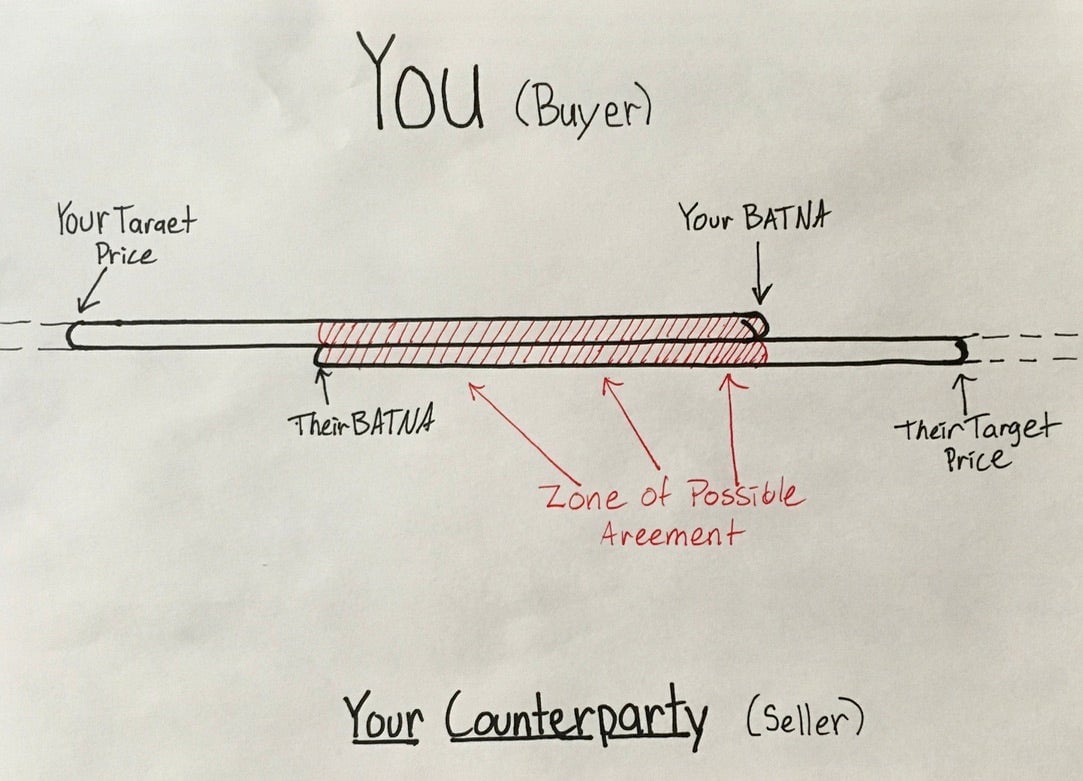MBAs learn this simple framework for winning negotiations
Anyone in the process of buying a car, accepting a job, or making a new hire faces a number of psychological challenges when approaching the negotiation: a desire to get the best deal, a fear of looking foolish to bosses or spouses, or even the pressure inherent in a conversation that can feel a lot like conflict.


Anyone in the process of buying a car, accepting a job, or making a new hire faces a number of psychological challenges when approaching the negotiation: a desire to get the best deal, a fear of looking foolish to bosses or spouses, or even the pressure inherent in a conversation that can feel a lot like conflict.
But smart negotiators focus on one thing above all else: BATNA.
Short for Best Alternative to a Negotiated Agreement, your BATNA is your next-best option if the negotiation fails. The phrase was coined by Harvard negotiation experts Roger Fisher and William L. Ury, and the idea behind it can inspire confidence or can make your weak position clear. It’s incredibly powerful, and building it is very important.
A few examples: in a salary negotiation, a job seeker’s BATNA could range from the weak “starting the search over” to the strong “taking an offer from a rival firm;” an effective BATNA for a car buyer is a strong, low offer from a competing dealer on an identical car; and for an entrepreneur in the midst of selling her company, the next best alternative to a negotiation may mean continuing current efforts to grow the business or planning for an IPO.
Whatever the case, BATNAs will help you do three things:
Define the scope of the negotiation. In every negotiation, each party comes to the table with a BATNA. An agreement’s ultimate form will fall between those two BATNAs, in what is called the “Zone of Possible Agreement (ZOPA).” Recognizing this immediately puts a negotiation into a manageable scope and will make analyzing offers easier.
For example, if you’ve just walked into Dealer A to negotiate on a car that’s listed at $30,000, your BATNA may be an offer from Dealer B for $29,000. Dealer A’s BATNA, meanwhile, may be $28,000, which means that the ultimate negotiated price should fall somewhere within the $1,000 range between $28k and $29k. Recognizing a deal’s limits help you set goals for your negotiation and evaluate offers somewhat more objectively.

Of course, determining another party’s BATNA can be incredibly difficult, which brings us to:
Think strategically about the other side’s position. In a typical negotiation, each side will try to keep its BATNA a secret in order to maintain as much leverage as possible, which makes determining the other side’s walk away price difficult if not impossible. Still, it’s worth the effort, as it may help you discover leverage that you wouldn’t have otherwise.
For example, in a salary negotiation, you may have limited insight into what others in your position are paid at a particular company. But you do know something about how much time your potential employer devotes to finding, interviewing and hiring candidates. You also likely have some sense of how rare your skills are and the market rate for those skills. If you think about these questions from the employer’s perspective, you can develop a better idea of what their BATNA is. If the employer can’t make a deal with you, will they simply open negotiations with their second-choice candidate, who likely has similar skills? Or will they have to start the time-consuming, expensive hiring process all over?
The answer to those questions will help you figure out your potential employer’s BATNA.
Avoid getting bogged down in details or tactics. It’s easy in a negotiation to worry about making convincing arguments, being appropriately aggressive, or making a strong case for an aspirational salary or job title. But if you’ve developed a strong BATNA, you’ve got the clarity of mind that comes with a safety net.
The key to an effective BATNA is to make sure it’s as strong as possible. If you’ve only got one offer, your BATNA in a salary negotiation will likely be staying in your current job and continuing your search. Perhaps that’s not the end of the world, but it certainly doesn’t help you as much as a strong offer from a competing firm. If you’re an entrepreneur selling a company, soliciting offers from a number of suitors is by far the best thing you can do.
Developing a strong BATNA won’t solve all your negotiation challenges, but it’ll go a long way toward easing your stress.